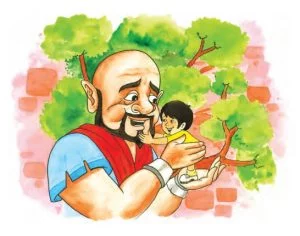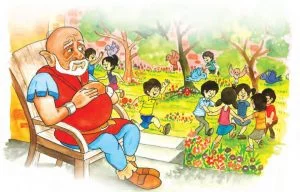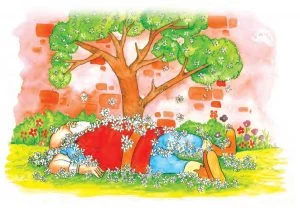From the Diary of Anne Frank Summary In English
Anne’s feelings about diary
Anne writes her diary. She feels that doing so is a strange experience for one like her. It is so because she has not written anything earlier. Secondly, no one would be interested in reading something written by her as she is a small girl.
Writes a diary
One day Anne felt a bit depressed. She felt that paper had more patience than people. She was wondering whether to stay in or go out. Finally, she stayed in and thought. She felt that she won’t let anyone read her ‘diary’ unless she found a real friend. So she wrote it.
She wrote that she was not completely alone in the world. But she had loving parents and a sixteen-year-old sister. She had about thirty people around her, she could call friends. Then she had a family, aunts and a good home. But she had had no true friend. She thought of having a good time when she was with friends. But she could not get closer. She admitted it her fault that she didn’t confide in each other. Since they were not liable to change, she started writing a diary. She made it her friend.
She wanted the diary to be her friend. So she named it as her friend Kitty. She wrote a brief sketch of her life, though she disliked doing so. So, she wrote it. She wrote that her father married her twenty-five year old mother at the age of thirty-six. Her sister Margot was bom in Frankfurt in Germany in 1926. She was born on 12 June 1929. Her father emigrated to Holland in 1933. Her mother Edith Hollander Frank went with her father to Holland. But she and her sister were sent to Aachen to stay with their grandmother. Then they went to Holland.
There she was sent to a Montessori nursery school. She stayed there until she was six. In the sixth class her teacher was Mrs. Kuperus, the headmistress. Both had tears when they bade farewell.
Reasons for not writing the Diary
In the summer of 1941 her grandma fell ill. She had to be operated upon. She died in January 1942. She thought of her greatly and she loved her still. They celebrated Anne’s birthday in 1942. The four of them were doing well till 20 June 1942. Then Anne wrote her diary again. It was like this.
About class affairs
It was the day of the declaration of results. Everyone in her class was in tension. The reason was who would go to the next class and who would not. They had bets with other boys on who would pass and who would not. She found the teachers as the most unpredictable creatures on the earth. She was not worried about her girl-friends and herself. She was sure to make that. But she was not sure about Maths. They could wait and told each other not to lose heart.
She went along her teachers pretty well. Mr. Keesing was a dull person who taught them Maths. He was always annoyed with her as she talked much. He gave her as a punishment, extra homework. It was in the form of an essay on ‘A Chatterbox’. She was unable to understand what she could write about it. She put a slip of it on her school bag. It was to remind herself to write later.
Does the homework given extra
In the evening, she had done her homework. She began thinking of the subject of the essay. She thought to write good points of arguing to prove the necessity of talking. Then she had an idea. She then wrote the three pages to her satisfaction. She wrote that talking was a feature of a student. Her mother also used to talk much. She inherited this trait from her mother. She tried to keep quiet.
Mr. Keesing read it and laughed. Then he gave her another essay as she didn’t stop talking. She was to write it on ‘An Incorrigible ’ Chatterbox’. She wrote it and it satisfied Mr. Keesing. She did not talk for two lessons. But she started speaking again in the third lesson. He again asked her to write an essay. It was : ‘Quack, Quack, Quack, Said Mistress , Chatterbox’. The class too roared into laughter hearing it. She also laughed. She wanted to write something original now. Her friend Sanne was good at poetry. She helped her to write the essay in verse.
Anne’s poem a joke on Mr. Keesing himself
Anne had finished her poem. It was about a mother duck and a father swan with three baby ducklings. The three ducklings were bitten to death by the father. It was because they quacked too much. Luckily, Mr. Keesing took the joke the right way. Mr. Keesing had played a joke on her. But she had had it on him. He ready the poem to the class adding his own comments. Since then she had been allowed to talk. She hadn’t even been given extra homework. Mr. Keesing continued making jokes .
ORAL COMPREHENSION CHECK
(Page 51)
Question 1.
What makes writing in a diary a strange experience for Anne Frank ?
Answer:
Two reasons make writing in a diary a strange experience. One, she has never written anything before. Second, perhaps no one will be interested in the thoughts of a thirteen- year-old school girl.
Question 2.
Why does Anne want to keep a diary ? (CBSE 2012)
Answer:
Anne wants to keep a diary because she had hardly any friends to confide in. Secondly, she can’t talk about day-to-day happenings. In keeping a diary she would do so.
Question 3.
Why did Anne think she could confide more in her diary than in people ?
Answer:
Anne thought so because she doesn’t have a true friend to confide in. She treats the diary not to use it the way most people use. But she would treat it as her best friend. Then diary would be closer than any friend.
ORAL COMPREHENSION CHECK
(Page 51)
Question 1.
Why does Anne provide a brief sketch of her life ?
Answer:
Anne provides a brief sketch of her life. She feels that no one would understand her stories in her diary if she did not write about her life.
Question 2.
What tells you that Annq loved her grandmother ?
Answer:
She loved her grandmother. It was because her parents went to Holland leaving her with her grandmother in Aachen. Her sister Margot also lived with her. Then she lived with her till she was six.
ORAL COMPREHENSION CHECK
(Page 54)
Question 1.
Why was Mr. Keesing annoyed with Anne ? What did he ask her to do ? (CBSE 2012)
Answer:
Mr. Keesing taught Mathematics to the author’s class. He was annoyed with Anne. It was because she talked so much. He warned her several times. But she couldn’t stop talking. She continued talking. He even gave her extra homework. But she still talked and talked.
After several warnings he gave her an essay on the subject ‘A Chatterbox’.
Question 2.
How did Anne justify her being a chatterbox in her essay ?
Answer:
In her essay she justified so by stating that talking was a student’s trait. She would do her best to cure herself of the habit. Her mother talked as much as she did if not more. Nothing could be done about inherited traits.
Question 3.
Do you think Mr. Keesing was a strict teacher ? (CBSE 2012)
Answer:
Mr. Keesing was not a strict teacher. In fact, he was a jovial kind of teacher. He was interested more that students should be taught practically.
Question 4.
What made Mr. Keesing allow Anne to talk in class ?
Answer:
Mr. Keesing allowed Anne to talk in the class after the joke Anne had played on him. He took Anne’s joke in right spirit. He read the poem to the class adding his own comments. He read it to several classes as well.
THINKING ABOUT THE TEXT
(Page 54)
Question 1.
Was Anne right when she said that the world would not be interested in the musings of a thirteen-year-old girl ?
Answer:
Yes, Anne was right in saying so. It was because the world usually is interested in reading things of great men. They may be politicians, statesmen or heavyweights in other fields of life.
Question 2.
There are some examples of diary or journal entries in the ‘Before You Read’ section. Compare these with what Anne writes in her diary. What language was the diary originally written in ? In what way is Anne’s diary different ?
Answer:
Anne mixes her diary writing with a few things of journals or memoirs. She uses her own genre of writing her diary. Her diary was written originally in Dutch language. It is different as it doesn’t follow the appropriate format. It is a mix of a journal, memoir, diary and log.
Question 3.
Why does Anne need to give a brief sketch about her family ? Does she treat ‘Kitty’ as an insider or an outsider ?
Answer:
Anne needs to give a brief sketch about her family. Without it no one will be interested in reading a diary of a small girl. She treats ‘Kitty’ as diary as an insider only.
Question 4.
How does Anne feel about her father, her grandmother, Mrs. Kuperus and Mr. Keesing ? What do these tell you about her ?
Answer:
Anne looks at her parents ‘adorable’. She is all love for her grandmother. She feels equally for her headmistress Mrs. Kuperus. She was in tears when Mrs. Kuperus was bidden farewell. She also loves her teacher Mr. Keesing though she calls him ‘old fogey’. These tell that she is an affectionate girl.
Question 5.
What does Anne write in her first essay ?
Answer:
Anne writes in her first essay that talking is a student’s trait. She would do her best to keep talking under control. Her mother also talked much. She had inherited this trait from her mother. Not much can be done about inherited traits.
Question 6.
Anne says teachers are most unpredictable. Is Mr. Keesing unpredictable ? How ? (CBSE 2012)
Answer:
Mr. Keesing is unpredictable. He gives and gives homework to Anne as a punishment. She does it as rightly as she can. She hopes that after the last essay, Mr. Keesing would give her homework again. But instead he allows Anne to talk in the class. He also doesn’t give her homework again.
Question 7.
What do these statements tell you about Anne Frank as a person ?
- We don’t seem to be able to get any closer, and that’s the problem. Maybe it’s my fault that we don’t confide in each other.
- I don’t want to jot down the facts in this diary the way most people would, but I want the diary to be my friend.
- Margot went to Holland in December, and I followed in February, when f was plunked down on the table as a birthday present for Margot.
- If you ask me, there are so many dummies that about a quarter of the class should be kept back, but teachers are the most unpredictable creatures on earth.
- Anyone could ramble on and leave big spaces between the words, but the trick was to come up with convincing arguments to prove the necessity of talking.
Answer:
- Anne is reserved
- She is self-confident and inventive
- She is humorous also.
- She is intelligent
- She has a sense of propriety and convincingness.
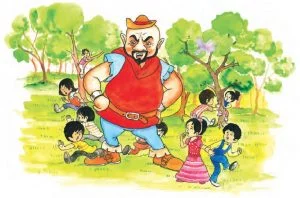
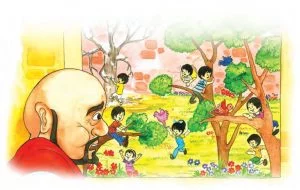 The giant woke up and looked out. He saw children playing in the garden and trees welcoming the kids by lowering their twigs. The giant understood why spring came so late.
The giant woke up and looked out. He saw children playing in the garden and trees welcoming the kids by lowering their twigs. The giant understood why spring came so late.